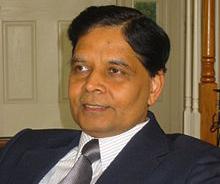Arvind Panagariya, Jagdish Bhagwati Professor of Indian Political Economy at Columbia University, has co-authored a book, which lambasted the view that poverty, illiteracy, and ill health afflict India because its leadership ignored them in favour of growth for its own sake. He tells Indivjal Dhasmana that India has made respectable progress in social indicators, given its growth trajectory over the years. He said the Reserve Bank of India (RBI) is overdoing its monetary stance by targeting to keep inflation at 5 per cent.
He tells Indivjal Dhasmana that India has made respectable progress in social indicators, given its growth trajectory over the years. He said the Reserve Bank of India (RBI) is overdoing its monetary stance by targeting to keep inflation at 5 per cent.
The Padma Bhushan awardee, who will be in Delhi for the Economic Conclave on December 14, also spoke on FDI in multi-brand retail, economic reforms, Barack Obama and outsourcing, besides various rating agencies warning India on a downgrade. Excerpts:
You have argued in your new book with Jagdish Bhagwati - "India's Tryst with Destiny" - that reforms are needed to push growth numbers that will give money to the government to reduce poverty and carry out social welfare. Does it mean that the government's social welfare programmes will take a hit due to the decline in growth numbers for over a year now?
No doubt about it. Slower growth is bound to translate into fewer revenue resources than would have been available had the economy remained on a high growth trajectory.
Given the political difficulty of cutting other expenditures such as those on defence and subsidies on fertiliser and food procurement, fewer revenue resources will mean smaller expenditure on social programmes relative to what would have transpired under higher growth.
You recently argued that there is no reason for the nation to be ashamed of its child malnutrition indicators. Are we comfortably placed in social indicators globally?
Given where we started at Independence in terms of literacy and health indicators and evaluated against our growth record over the past 60 years, we have made respectable progress in social indicators.
I do not buy the common assertion that we have performed worse than Bangladesh. As regards the claim of many reforms critics that despite high growth, proportionately more children in India suffer from malnutrition than in virtually every country in sub-Saharan Africa - which is what led the Prime Minister to say that child malnutrition is a matter of national shame - it is altogether absurd.
It is rooted in indicators based on the unfounded assumption that with proper nutrition, Indian children can achieve the same height and weight on average as American or Dutch children.
It ignores the obvious fact that even the Japanese newborns are on an average smaller and lighter
This being said, if we had grown faster in the 1960s and 1970s as was the case with South Korea, Taiwan and Singapore, we could have devoted a lot more resources to improving educational and health outcomes a lot sooner and made correspondingly faster progress.
Parliament recently voted in favour of 51 per cent FDI in multi-brand retail. But questions still remained in the minds of small traders that they will be wiped out. How serious are these apprehensions?
In the next several years, growth in the retail sector will provide enough room for the growth of the small shopkeepers as well as large retailers, both domestic and foreign.
Over the very long run meaning several decades, as India becomes wealthy and modern, we will see organised retail become more dominant. And that is as it should be.
Once educated and rich, the children of most small shopkeepers will want to do bigger and better things than succeed their parents and will themselves want to shop at the modern shopping malls!
Now, will come a host of financial sector reforms Bills. Do you believe these will fall prey to partisan politics in India? Can there be a broad consensus on reforms in India?
I think the common man has seen the benefits of reforms and wants more of them. The political problem is within the cabinet instead.
Just see the difficulty the Opposition has had persuading even a few thousand shopkeepers to come out to protest against FDI in retail trade. Mamata Banerjee could not get much traction even in Kolkata!
High fiscal deficit and inflation rate are not letting RBI cut the repo rate. In this conflict, which side will you take - propelling growth or controlling inflation?
I strongly believe that the RBI is overdoing it by insisting on bringing inflation down to 5 per cent. There is nothing holy about that goal when economic growth has plummeted. So I will opt for loosening the grip on the money supply a bit.
How seriously should India take some of the rating agencies warning on a downgrade? There are some, however, like Moody's, retaining India's outlook.
Whether or not we like it, investors do move in and out of the country based on what the ratings agencies do. So even if I disagree with their judgement, we cannot ignore them.
How do you see the new Obama administration so far as outsourcing is concerned?
I am afraid so far the administration has done nothing to suggest that with the elections over, the anti-outsourcing rhetoric is behind it. President Obama will need to do more to calm the fears of the Indian IT industry.










 © 2025
© 2025